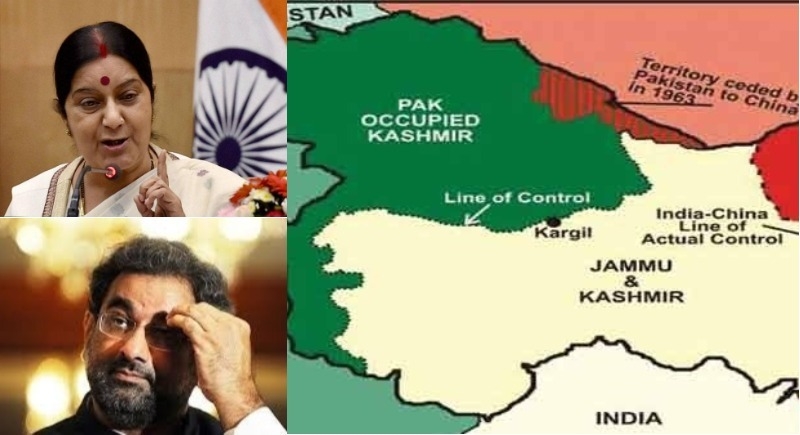New Delhi hits out at Pakistan over changes to Azad J&K Constitution; asks to vacate illegally occupied territories
New Delhi, June 12: India on Monday lodged a strong protest with Pakistani authorities against so-called "Azad Jammu and Kashmir Interim Constitution (13th Amendment) Act 2018”, or any other action to alter the status of territories illegally occupied by Pakistan in Jammu and Kashmir and asked it to vacate all such areas.

Notably, India reacted to the changes in the 'Azad Jammu and Kashmir Interim Constitution' (13th Amendment) Act, 2018, which abolished the AJK Councils' administrative and financial powers, reducing it to an advisory body.
New Delhi has warned Pakistan through diplomatic channel against the so-called "Azad Jammu and Kashmir Interim Constitution (13th Amendment) Act 2018”. In a stern manner, India has clearly conveyed that the entire state of Jammu and Kashmir is an integral part of India by virtue of its accession in 1947 and further asked to vacate all areas under its illegal occupation.
In Press statement, the External Affairs Ministry said, “The Government of India has conveyed a strong protest through diplomatic channel today against the so-called Azad Jammu and Kashmir Interim Constitution (13th Amendment) Act 2018.”
“It was clearly conveyed that the entire State of Jammu and Kashmir, which also includes the so-called 'Azad Jammu and Kashmir' is an integral part of India by virtue of its accession in 1947. Any action to alter the status of any part of the territory under forcible and illegal occupation of Pakistan has no legal basis whatsoever, and is completely unacceptable. Instead of seeking to alter the status of the occupied territories, Pakistan should immediately vacate all areas under its illegal occupation,” the statement concluded.
Last month, India had summoned Pakistan's deputy high commissioner Syed Haider Shah and lodged a strong protest over Islamabad's latest move relating to administrative authority over the Gilgit-Baltistan region, saying any action to alter the status of any part of the territory under its "forcible and illegal occupation" has no legal basis.
The MEA had also said that it conveyed to Shah that the entire state of Jammu and Kashmir, which also includes 'Gilgit-Baltistan' areas, is an integral part of India by virtue of its accession in 1947. Through its order on 'Gilgit-Baltistan' on 21 May, Pakistan PM Shahid Khaqan Abbasi seized more authority from the local council to deal with the affairs of the region.
Earlier, Pakistan was planning to declare the strategic Gilgit-Baltistan region as the fifth province which actually was an integral part of India. But Indian government and locals in Gilgit-Baltistan registered a strong protest against Pakistan’s illegal move due to which they have to back off from their decision.
BACKGROUND:
Earlier, Gilgit-Baltistan was treated as a separate geographical entity by Pakistan. However, it has regional assembly and an elected Chief Minister.
Gilgit-Baltistan is a legitimate part of Jammu and Kashmir when the accession document was signed by Raja Hari Singh in 1947. But the betrayal of some British officers and raised communal sentiments hijacked the Gilgit-Baltistan at that time. The map of Jammu and Kashmir features the area as part of India.
In 1963, Pakistan illegally ceded the Shaksgam Valley of Gilgit-Baltistan to China in a 1963 border agreement. The area is significant to both Pakistan and China as the $46 billion China-Pakistan Economic Corridor (CPEC) passes through the region. Interestingly, it is also believed that due to China’s pressure Pakistan is planning to declare Gilgit-Baltistan its 5th Province.
The Gilgit-Baltistan occupied by Pakistan covers 85,793 sq km and is treated as a separate geographical entity by Pakistan. It has a regional assembly and an elected chief minister. The area was divided in 1970 into two: Mirpur-Muzaffarabad (Pakistan-occupied Kashmir) and the Federally Administered Gilgit-Baltistan.